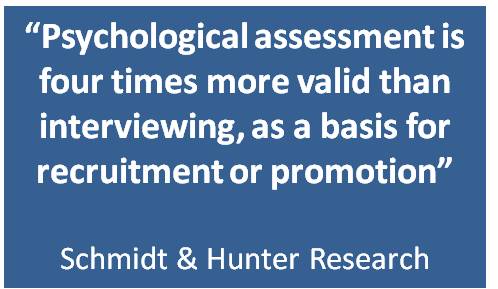Finding talent in a decreasing pool
The role of HR more than ever is to help management deliver more output for a given total salary cost or deliver the same output for a lower total salary cost.

The problem is that despite the GFC, unemployment is low, diminishing the available pool of talent. The GFC has also created unhappy employees, unrewarded despite ever increasing workloads and although hanging on to their jobs, they are ready to jump to the next business that promises a better situation.
Employers need to change their traditional recruitment strategies to improve the chances of hiring the right person first time.
The reality is that recruitment techniques, the traditional interview, panel interview, reference checks, and psychometric testing all create a sophisticated enough process to find good candidates, even great candidates. The problem is that they are often the wrong candidate for the role. Research has identified that 30% of people believe they are in the wrong job. Why, because recruitment processes focus on experience instead of what a person is innately good at.
-
When managers brief recruiters to fill a role, the focus is generally on listing the hard skills required in the role. That is, how many years of experience, or what level of education is essential to perform well in that role. But diversification of jobs has created so many sub-categories of role that it is hard to find anybody who has the precise experience and skills to match a very specific job description. Fewer candidates apply or ever make the first cut and this creates further scarcity.
-
Then when it comes to the interview and making the appointment, the focus moves away from hard skills to a set of subjectively defined soft skills. Whilst interviewing is necessary to get a sense of the candidate's personality, the process is ineffective at identifying the necessary traits for high performance in a particular role.
- Most of us make snap judgements when dealing with others.
- In an interview situation, judgements are made within the first four minutes and even in the face of substantial alternate information we rarely, if ever, review our initial judgment.
- We rate fast talkers as more intelligent than slow talkers.
- We make our interview judgments on communication skills.
- It is extremely difficult to assess intelligence at interview.
- Most line managers, whilst believing they are good interviewers, find recruitment decision making stressful.
The truth is that there is a lot of talent to be snapped up, if we employ a different strategy and profile jobs scientifically, matching candidate competencies to the precise role they are interviewing for.
